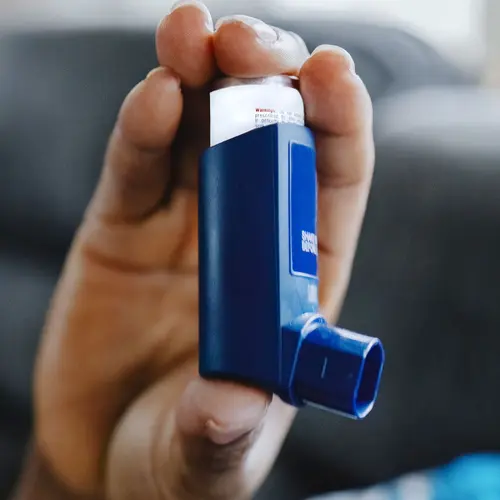If you have asthma, it is important to find support. The people around you -- family members, friends, co-workers -- can all give you support with asthma. They should know what to do in an asthma emergency, and they should also know that asthma can be controlled and managed.
As you find support with asthma, it’s important to give a copy of your asthma action plan to close friends, family members, and coworkers. Your asthma action plan should include the following:
- Contact information for your asthma health care provider
- A list of asthma medications you take, how often you take them, and how much you take (dosage)
- A list of asthma triggers (substances or behaviors that make breathing more difficult)
- A description of three "zones" of asthma control: green (the best), yellow (control is worsening), and red (medical alert stage). These stages are determined by peak flow meter readings that measure your breathing. Green is for the times when peak flow readings are 80% to 100% of your personal best reading; yellow for when the peak flow is 50% to 79% of your best; and red for when breathing is 50% or less of your personal best, which requires immediate medical attention. Medication information should be included for all zones.
Asthma action plans are useful for anyone with an asthma diagnosis, including adults with adult-onset asthma, teenagers, and kids with childhood asthma.
Finding Support for Kids With Asthma
It is especially important that school officials have a copy of your child’s asthma action plan and information on asthma medications your child needs to take at school, so they know what to do in case of emergencies. Your child's teachers, as well as the principal and office staff, should be aware of the details of the plan so they know how to manage your child’s asthma at school. Physical education (PE) teachers also need to know if your child has exercise-induced asthma.
Parents should contact the school nurse and the people who staff the nurse’s office when the nurse is not there. Parents and students need to be aware of school medication policies, and students should have access to asthma inhalers or bronchodilators for asthma symptom relief.
Other Ways to Find Asthma Support
Support groups provide a very useful sharing experience. The Asthma and Allergy Foundation of America offers support groups in which you can learn new ways of dealing with your illness. You may want to share approaches you have discovered with others. You will also gain strength in knowing that you are not facing hardship alone. There are also other organizations that provide excellent support for those with asthma.
Asthma Resources
These resources are provided for your reference and may contain information that is not necessarily endorsed by WebMD.
Every effort has been made to keep this information as current and correct as possible, but the information may change on occasion.
Allergy & Asthma Network Mothers of Asthmatics
The Allergy & Asthma Network Mothers of Asthmatics, a patient advocacy organization, was started by a woman with children who have asthma. Members consist of families who want to overcome allergies and asthma.
8229 Boone Boulevard, Suite 260
Vienna, VA 22182
(800) 878-4403
American Academy of Allergy Asthma & Immunology
The American Academy of Allergy Asthma & Immunology (AAAAI) is one of the nation's largest professional medical specialty organizations. Their journal is highly respected worldwide, with many studies about asthma each month.
555 East Wells Street, Suite 1100
Milwaukee, WI, 53202-3823
(414) 272-6071
The Asthma and Allergy Foundation of America
The Asthma and Allergy Foundation of America (AAFA), a nonprofit organization founded in 1953, works to develop and implement public policies to improve the quality of life for people with asthma and allergies. To find a chapter in your area, go to the Asthma and Allergy Foundation of America. The AAFA also prepares independent standards for testing a wide range of products to determine their suitability for asthmatics and individuals with associated allergies.
235 South Clark St., Suite 305
Arlington, VA 22202
(800) 7-ASTHMA (727-8462)
American College of Chest Physicians
2595 Patriot Boulevard
Glenview, IL 60026
(224) 521-9800 or 1-800-343-2227
American Lung Association
The American Lung Association is the oldest voluntary health organization in the United States. They provide information on asthma, allergies, and other respiratory illnesses as well as ways to stop smoking. For in-depth information on ongoing clinical trials, go to the American Lung Association's Find a Clinical Trial.
55 W. Wacker Drive, Suite 1150
Chicago, IL 60601
(800) LUNGUSA 586-4872
The National Heart Lung and Blood Institute
The National Heart Lung and Blood Institute plans, conducts, and supports research, clinical trials, and observational studies related to the causes, diagnosis, prevention, and treatment of heart, blood vessel, lung, and blood diseases, and sleep disorders.
The National Institute of Allergy and Infectious Diseases
The National Institute of Allergy and Infectious Diseases conducts research in allergic asthma and infections, such influenza. The NIAID funded the National Inner City Asthma Study, which determined that control of indoor allergens improved asthma control in children living in cities across the U.S.
National Jewish Medical and Research Center
A global leader in lung, allergic, and immune diseases, the National Jewish Medical and Research Center provides patient information, research, and a medical library on topics such as COPD, allergy, asthma, sleep, tuberculosis, and more.
Environmental Protection Agency
The Environmental Protection Agency (EPA) has funded many studies about the dangers of outdoor air pollution, such as ozone, NOx, sulfur dioxide, and smoke, for those with asthma. They produce "Tools for Schools," a great guide for reducing asthma triggers in schools, and have a fun Kids Club for sleuthing causes of environmental disease.

